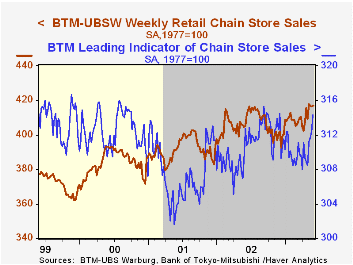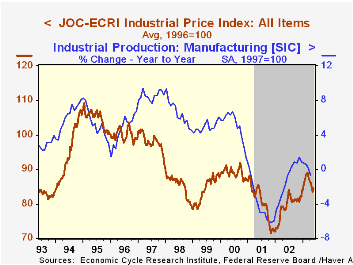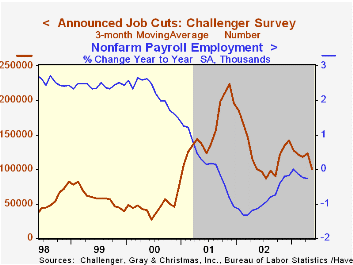 Global| Jun 03 2003
Global| Jun 03 2003Chain Store Sales Flat
by:Tom Moeller
|in:Economy in Brief
Summary
Chain store sales were unchanged last week. Sales have meandered sideways since the first week of May, according to the BTM-UBSW survey. Because of a large 2.1% jump in sales to open the month, May sales were 2.0% above the April [...]

Chain store sales were unchanged last week. Sales have meandered sideways since the first week of May, according to the BTM-UBSW survey.
Because of a large 2.1% jump in sales to open the month, May sales were 2.0% above the April average.
During the last five years there has been a 59% correlation between the year-to-year percent change in chain store sales and the change in nonauto retail sales less gasoline.
The BTM-UBSW retail chain-store sales index is constructed from the sales results reported by seven retailers: Dayton Hudson, Federated, Kmart, May, J.C. Penney, Sears and Wal-Mart.
| BTM-UBSW (SA, 1977=100) | 5/31/03 | 5/24/03 | Y/Y | 2002 | 2001 | 2000 |
|---|---|---|---|---|---|---|
| Total Weekly Retail Chain Store Sales | 417.0 | 417.0 | 3.0% | 3.6% | 2.1% | 3.4% |
by Tom Moeller June 3, 2003

The index of commodity prices compiled by the Journal of Commerce (JoC) and the Economic Cycle Research Institute (ECRI)moved higher during much of last month. The All Items Industrial Price Index gained 1.4% from the lows of the second week in May.
After earlier declines, crude oil prices recovered with the US spot price for West Texas Intermediate crude rising to $30.73 yesterday versus a low of $25.23 late in April.
Metals prices also moved up with the JoC-ECRI index of metals prices up 2.0% from the April low due to gains in aluminum and steel scrap prices.
The JoC index of textile prices generally has been soft, down 1.1% yesterday from the May average which was off 0.9% from April. Since yearend these prices are down slightly.
During the last ten years there has been a 64% correlation between the level of the JoC-ECRI All Items Index and the y/y change in factory sector industrial production.
For more on commodities prices from ECRI click here.
| JOC-ECRI Industrial Price Index (1996=100) | 6/02/03 | 12/31/02 | 2002 | 2001 | 2000 |
|---|---|---|---|---|---|
| All Items | 84.5 | 83.9 | 79.6 | 80.4 | 89.0 |
| Textiles | 62.1 | 62.4 | 59.7 | 61.3 | 69.7 |
| Metals | 80.8 | 75.8 | 75.2 | 75.5 | 87.8 |
| Miscellaneous | 90.2 | 90.1 | 85.9 | 87.4 | 86.5 |
| Petroleum Products | 119.8 | 132.5 | 110.2 | 109.0 | 137.6 |
by Tom Moeller June 3, 2003

According to Challenger, Gray & Christmas, announced job cuts collapsed 53.1% in May and more than reversed the surge in April. The drop pulled the three month moving average of job cut announcements down sharply.
Job cut announcements differ from layoffs in that many are achieved through attrition or just never occur.
Announcements of job cuts fell across the board except in the computer, insurance and transportation industries.
During the last ten years there has been a (negative) 75% correlation between the level of announced job cuts and the y/y percent change in nonfarm payrolls.
| Challenger, Gray & Christmas | May | April | Y/Y | 2002 | 2001 |
|---|---|---|---|---|---|
| Announced Job Cuts | 68,623 | 146,399 | -19.2% | 1,431,052 | 1,956,876 |
Tom Moeller
AuthorMore in Author Profile »Prior to joining Haver Analytics in 2000, Mr. Moeller worked as the Economist at Chancellor Capital Management from 1985 to 1999. There, he developed comprehensive economic forecasts and interpreted economic data for equity and fixed income portfolio managers. Also at Chancellor, Mr. Moeller worked as an equity analyst and was responsible for researching and rating companies in the economically sensitive automobile and housing industries for investment in Chancellor’s equity portfolio. Prior to joining Chancellor, Mr. Moeller was an Economist at Citibank from 1979 to 1984. He also analyzed pricing behavior in the metals industry for the Council on Wage and Price Stability in Washington, D.C. In 1999, Mr. Moeller received the award for most accurate forecast from the Forecasters' Club of New York. From 1990 to 1992 he was President of the New York Association for Business Economists. Mr. Moeller earned an M.B.A. in Finance from Fordham University, where he graduated in 1987. He holds a Bachelor of Arts in Economics from George Washington University.
More Economy in Brief
 Global| Feb 05 2026
Global| Feb 05 2026Charts of the Week: Balanced Policy, Resilient Data and AI Narratives
by:Andrew Cates






